Key takeaways:
- Self-doubt often arises from comparisons to others, but recognizing it can lead to personal growth and improved performance.
- Community support is vital; encouragement from peers helps combat self-doubt and fosters a safe environment for self-expression.
- Building confidence requires consistent practice, setting achievable goals, and celebrating small victories to reshape self-image.
- Reflection and embracing failure are crucial for learning; journaling experiences can help confront and manage self-doubt effectively.
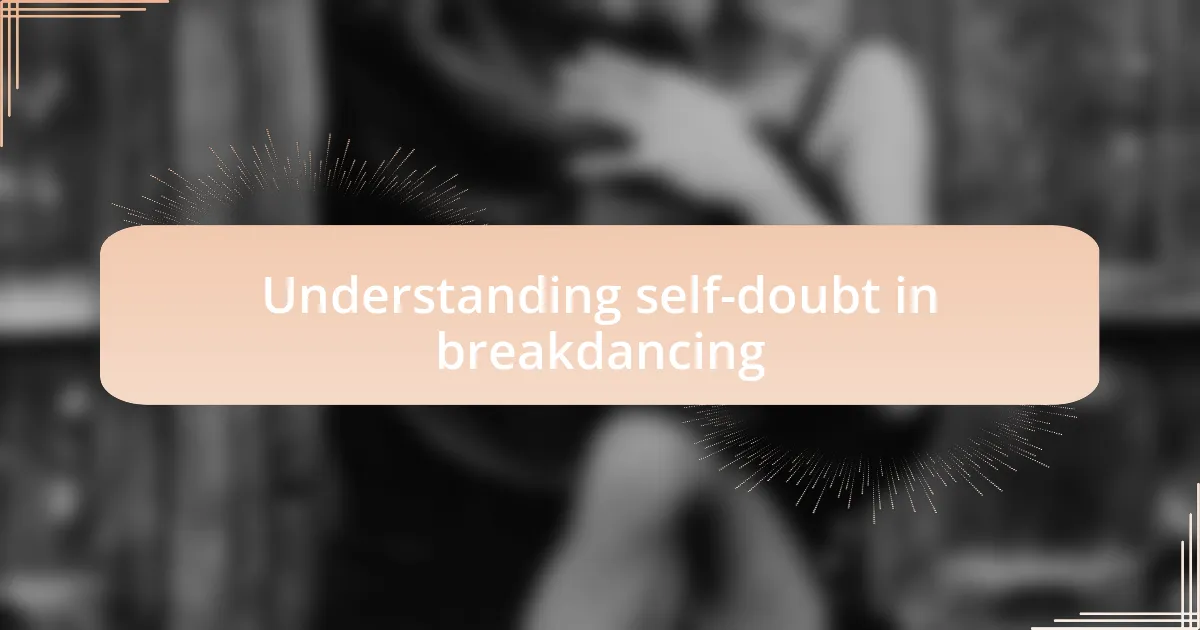
Understanding self-doubt in breakdancing
Self-doubt in breakdancing often creeps in when we compare ourselves to others, especially to those who seem to have mastered the craft with effortless style. I remember a jam where a b-boy hit a headspin that left the crowd in awe, and instead of celebrating his talent, I found myself questioning my own abilities. Have you ever felt that gnawing voice telling you that you’re just not good enough?
The pressure to perform can amplify these doubts, making even the simplest moves feel daunting. During my early battles, I frequently hesitated to showcase my signature move, fearing it wouldn’t impress the judges. I began to realize that self-doubt can be a double-edged sword; it can motivate us to improve but can also hold us back from expressing our true selves on the floor.
What I’ve learned is that recognizing self-doubt is the first step towards overcoming it. Instead of allowing it to hinder my performance, I started channeling those feelings into my preparation, viewing each moment of uncertainty as a challenge to grow. Have you found any effective strategies for turning self-doubt into a source of strength in your journey as a dancer?
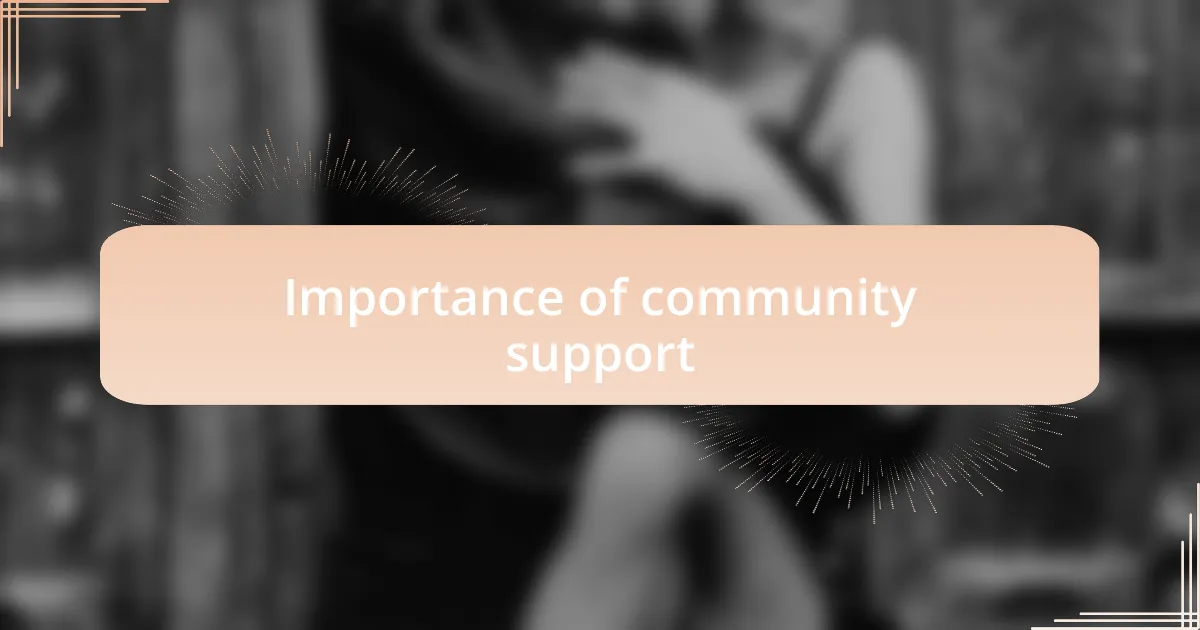
Importance of community support
Community support plays a crucial role in overcoming self-doubt. I recall a time when I felt completely discouraged after a rough bout, questioning if I belonged in the breakdancing scene. But when my crew rallied around me, sharing their stories of struggle and growth, it reminded me that even the best have faced the same battles. Doesn’t it feel empowering to know you aren’t alone in your journey?
Encouragement from fellow dancers can be a powerful motivator. I remember receiving unexpected praise from a dancer I admired after a practice session. That small moment shifted my perspective entirely, reigniting my passion for the craft. How often do we underestimate the impact that our words can have on someone else’s confidence?
Moreover, being part of a supportive community fosters an environment where we can take risks without fear of judgment. During sessions, I’ve often found that the more we share our vulnerabilities, the stronger our connections become. It becomes easier to embrace our flaws, doesn’t it? After all, it’s in those moments of authenticity that we often find our greatest strength.
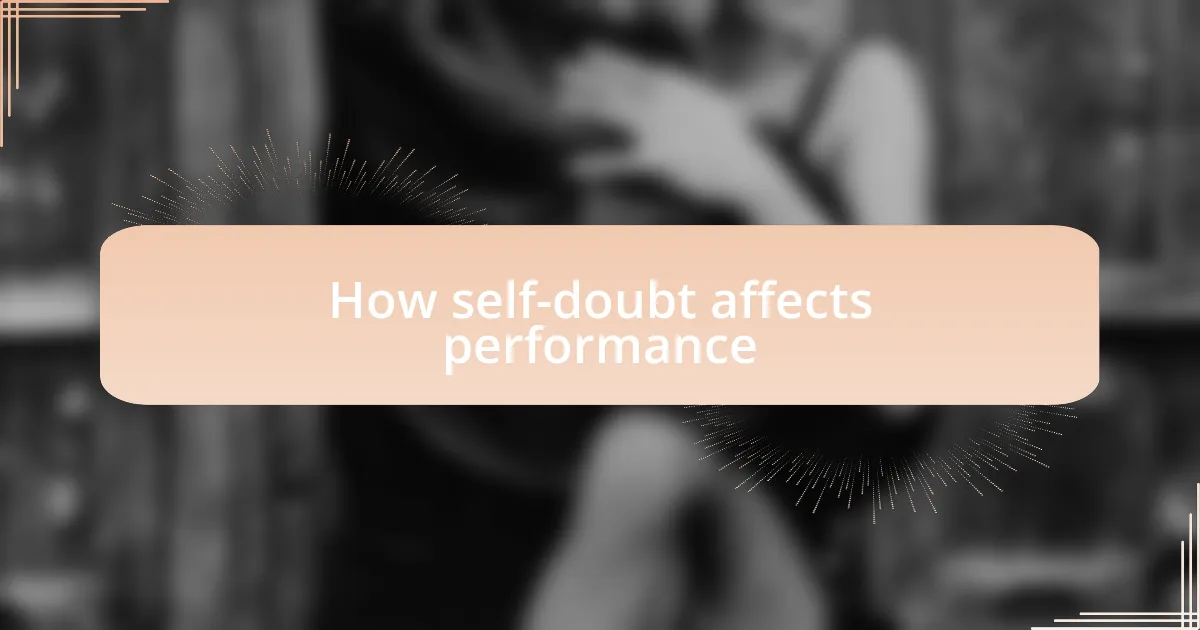
How self-doubt affects performance
Self-doubt can be a silent killer of performance, often creeping in just before you hit the dance floor. I remember a competition where I felt the pressure weighing heavily on me, leading to shaky moves and a lack of confidence. It’s frustrating to think about how much that doubt can cloud judgment and stifle creativity in the moment, isn’t it?
When I’m consumed by self-doubt, I find it challenging to connect with the music. I’ve had moments during practice when I just couldn’t find my groove, feeling like I was dancing through a fog. In those instances, I learned that acknowledging those feelings, rather than pushing them away, was crucial. Have you ever experienced a block like that? Recognizing the doubt is the first step to overcoming it.
Performance anxiety can also feed into a cycle of self-doubt – you hesitate, which leads to mistakes, which only amplifies that nagging feeling that you’re not good enough. I recall a time when I missed my signature move during a performance because I was too focused on what the crowd might think. It’s a tough realization that when we doubt ourselves, we often forget to trust in our training and instincts. How many times have we let that inner critic overshadow our passion?
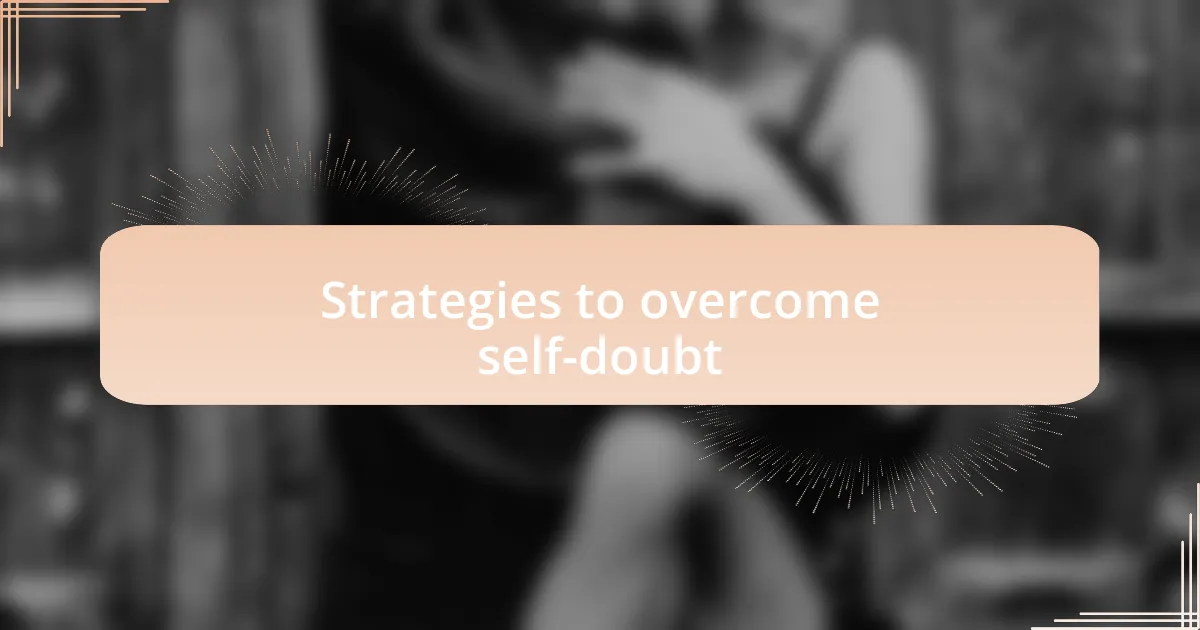
Strategies to overcome self-doubt
Building a routine can be a powerful way to combat self-doubt. I remember when I began incorporating consistent warm-ups before practice sessions. It not only helped to physically prepare my body but also created a mental space for me to focus. Establishing this routine calmed my nerves and gave me a sense of control, like I was asserting my presence on the dance floor. Have you ever found that a familiar ritual helped ease your anxieties?
Another strategy is to seek feedback from trusted fellow dancers. I once had a friend who pointed out the strengths in my style that I overlooked, reinforcing my belief in myself. It was a game-changer to hear constructive praise, reminding me that my passion and dedication were recognized. Engaging with others in the community not only uplifts you but also helps you see your journey through a different lens. How can we uplift each other in times of doubt?
Visualization is also a technique I swear by. Before stepping on stage, I picture myself performing my best moves, feeling the rhythm, and the energy of the audience. This mental rehearsal instills confidence and sets a positive tone for my performance. It’s amazing how vividly imagining success can transform that anxious energy into excitement. Have you tried using your mind to shape your reality in moments of doubt?
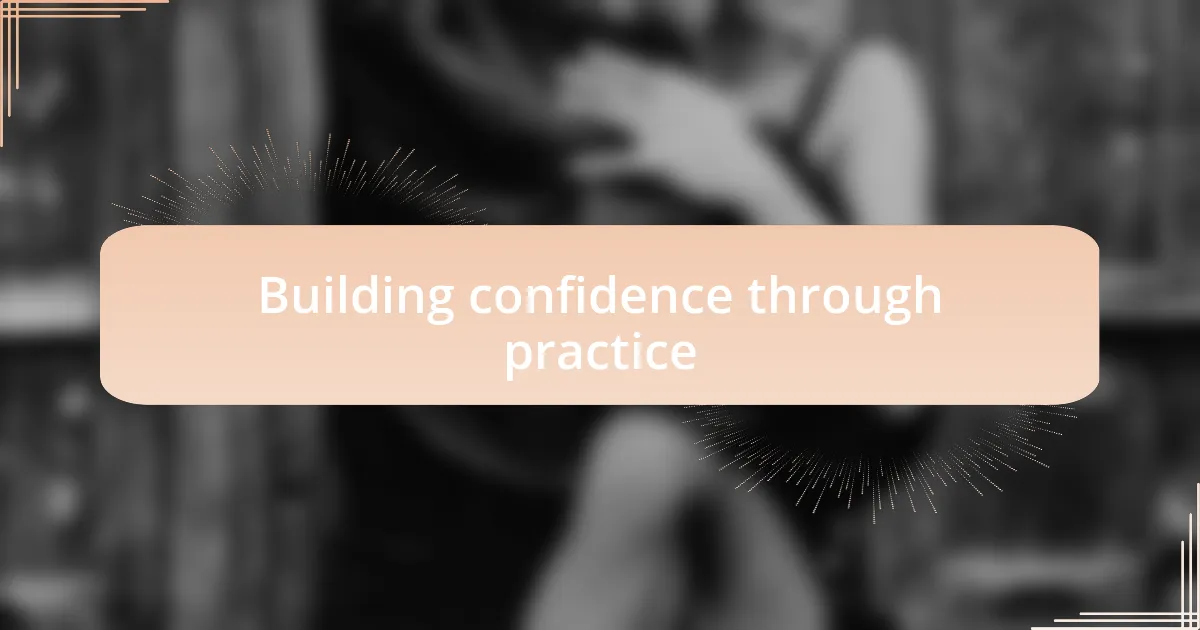
Building confidence through practice
Building confidence through practice is often about embracing the discomfort that comes with learning something new. I remember tackling a particularly tricky freeze; each failed attempt felt like a setback. However, after countless hours of repeated practice, that freeze transformed from a source of anxiety into a reliable part of my routine. It became clear to me that scraping the surface of my potential required perseverance and the willingness to stumble along the way. Have you pushed through similar frustrations to discover new heights in your skills?
The beauty of dedicated practice lies in the small victories. There was a moment when I nailed a sequence I had struggled with for months. The elation I felt was incredible—it was as if I had unlocked a new level in my dancing journey. Each time we practice, we not only refine our techniques but also build our resilience against self-doubt. It’s in those tiny achievements that we can gradually start cultivating a stronger belief in ourselves. How often do we overlook the importance of celebrating those little wins?
Moreover, practicing with intention allows us to set achievable goals, creating a roadmap to follow as we build our confidence. I often break down my sessions into focused objectives, like mastering a specific move or increasing my stamina. This structured approach not only keeps me motivated but also reinforces my progress in tangible ways. When I can see my growth on paper or in the mirror, it reshapes my self-image, replacing uncertainty with a growing pride in my abilities. What goals can you set for yourself to help track your journey in dance?
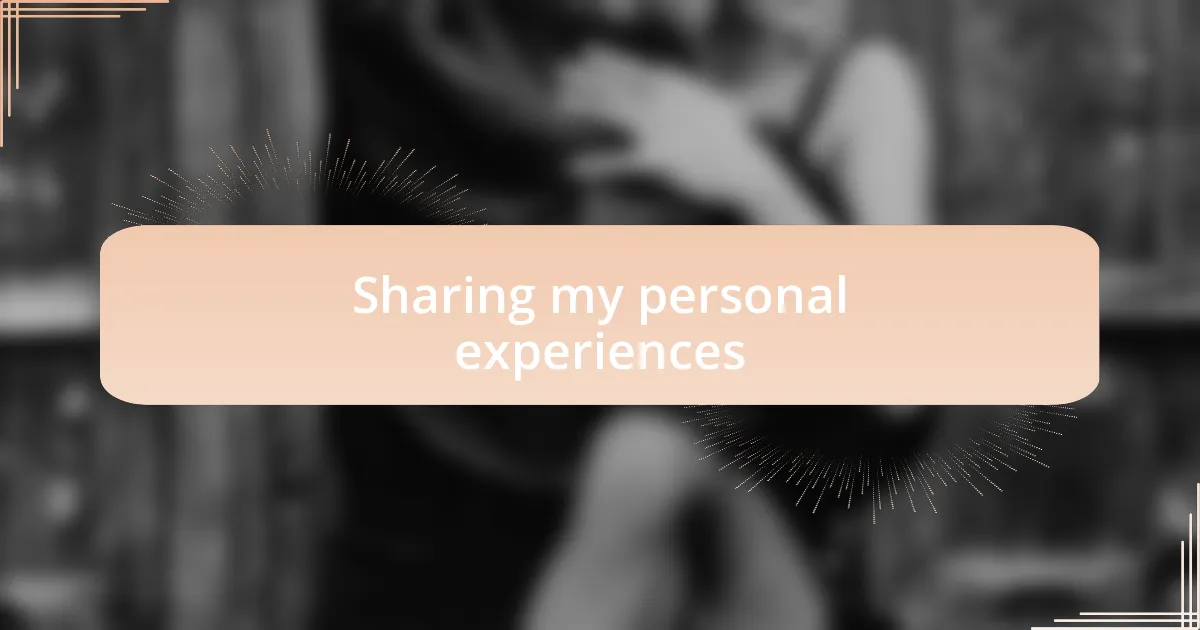
Sharing my personal experiences
Sharing my experiences with self-doubt in breakdancing has taught me invaluable lessons about resilience. There was a time when I stood on the sidelines, watching others effortlessly execute moves I could only dream of doing. The feeling of inadequacy was overwhelming, but it pushed me to confront my fears head-on, eventually leading to breakthroughs I never thought possible.
I vividly recall a moment during a crew battle when I hesitated to jump in. My heart raced, and self-doubt clawed at me, whispering that I wasn’t good enough. Yet, when I finally broke free from that paralyzing fear and took the floor, I felt an incredible rush. Each spin and freeze became a defiance against my inner critic, reminding me that courage often begins with a single step—even if that step is filled with uncertainty. Have you ever found yourself afraid to seize an opportunity, only to discover strength within you when you do?
Reflecting on my journey, I’ve realized that self-doubt never truly disappears; it just becomes more manageable through experience. I still face moments where I question my skills, especially after a tough practice session. Yet, each time I overcome that hesitance and dance with authenticity, I feel a little more grounded in my abilities. It’s a continuous cycle of doubt and triumph—one that ultimately enriches my passion for breakdancing. How do you navigate your own battles with self-doubt in creative expressions?
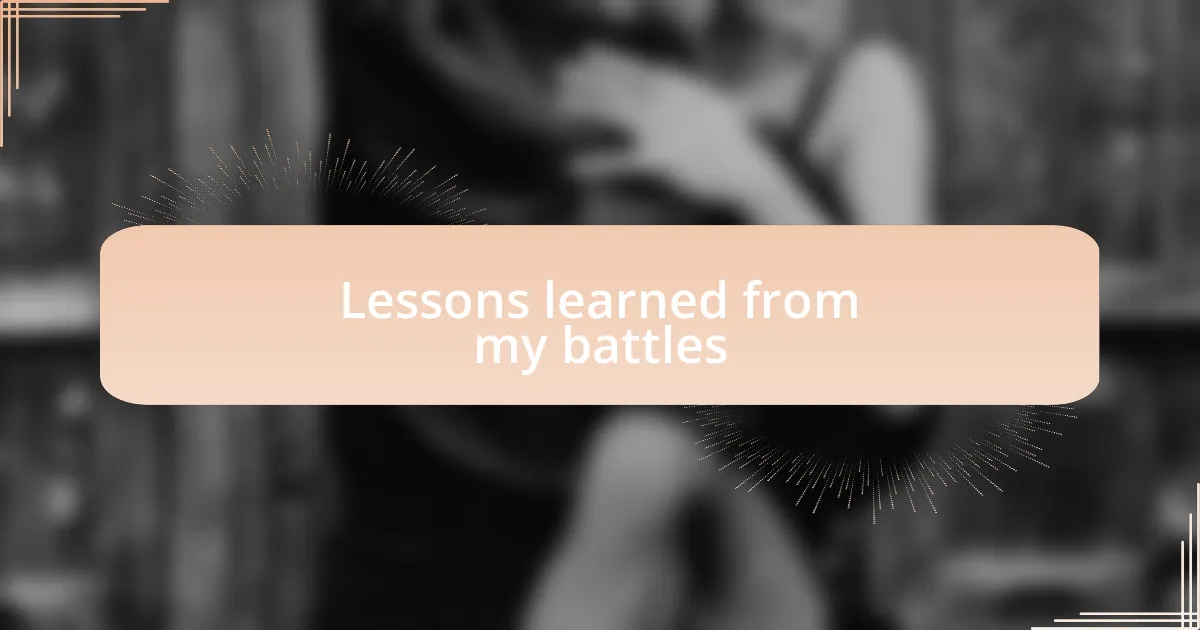
Lessons learned from my battles
The most profound lesson I learned from my battles with self-doubt is the importance of community. There were countless times when I stood in a cypher, feeling isolated in my insecurities. But when my fellow dancers encouraged me or shared their own struggles, it reminded me that we’re all navigating similar challenges. Have you ever felt the weight of doubt lift when you realized you weren’t alone?
Another key insight was the power of reflection after each practice. I’ve found that writing down my feelings and progress helps to demystify my fears. In the beginning, it felt daunting to put my thoughts on paper, but now, revisiting those old doubts allows me to see how far I’ve come. It’s like having a conversation with my past self. How might journaling your experiences help you confront your own self-doubt?
Lastly, I’ve learned that embracing failure is essential for growth. I remember a performance where everything went wrong; I stumbled and felt crushed. In that moment, instead of letting it define me, I chose to explore what went wrong and how I could learn from it. This shift in perspective transformed my setbacks into stepping stones. What if we viewed each failure as an opportunity to refine our craft rather than a reason to give up?